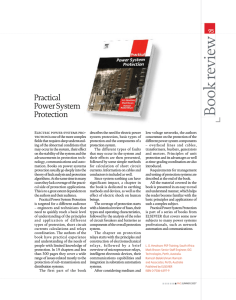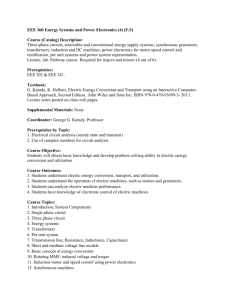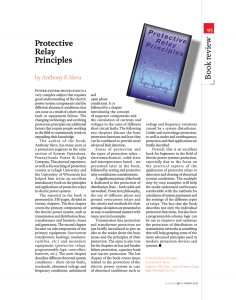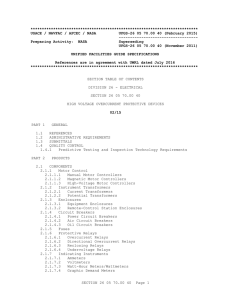Electrical & Instrumentation Engineering (Electrical Engg)
advertisement
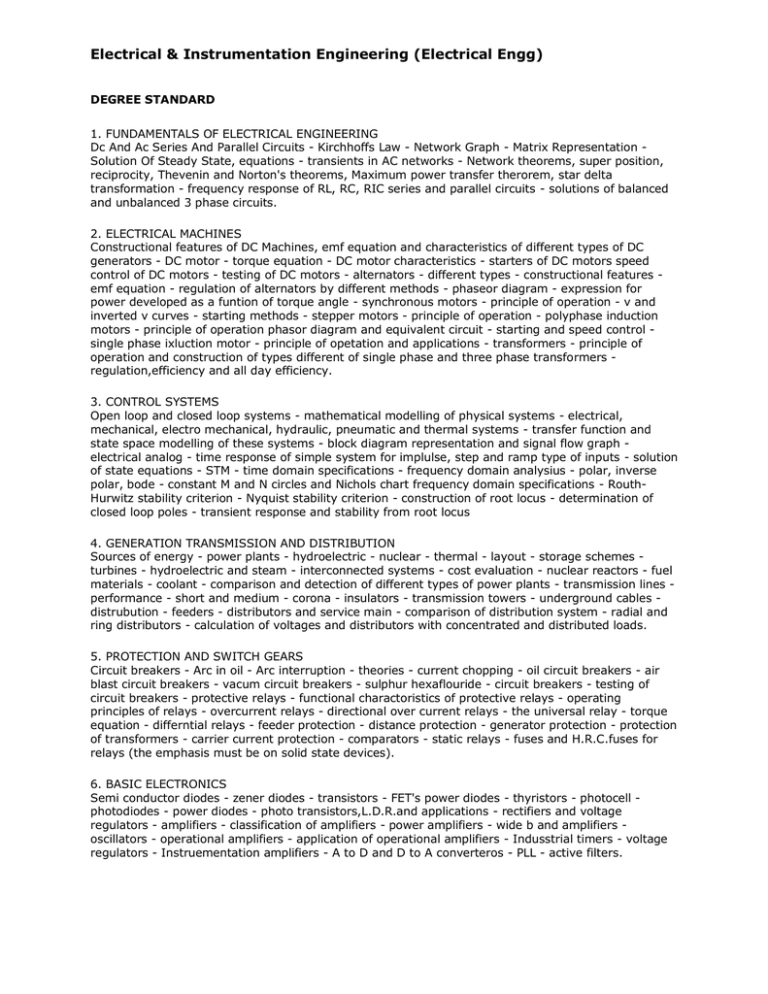
Electrical & Instrumentation Engineering (Electrical Engg) DEGREE STANDARD 1. FUNDAMENTALS OF ELECTRICAL ENGINEERING Dc And Ac Series And Parallel Circuits - Kirchhoffs Law - Network Graph - Matrix Representation Solution Of Steady State, equations - transients in AC networks - Network theorems, super position, reciprocity, Thevenin and Norton's theorems, Maximum power transfer therorem, star delta transformation - frequency response of RL, RC, RIC series and parallel circuits - solutions of balanced and unbalanced 3 phase circuits. 2. ELECTRICAL MACHINES Constructional features of DC Machines, emf equation and characteristics of different types of DC generators - DC motor - torque equation - DC motor characteristics - starters of DC motors speed control of DC motors - testing of DC motors - alternators - different types - constructional features emf equation - regulation of alternators by different methods - phaseor diagram - expression for power developed as a funtion of torque angle - synchronous motors - principle of operation - v and inverted v curves - starting methods - stepper motors - principle of operation - polyphase induction motors - principle of operation phasor diagram and equivalent circuit - starting and speed control single phase ixluction motor - principle of opetation and applications - transformers - principle of operation and construction of types different of single phase and three phase transformers regulation,efficiency and all day efficiency. 3. CONTROL SYSTEMS Open loop and closed loop systems - mathematical modelling of physical systems - electrical, mechanical, electro mechanical, hydraulic, pneumatic and thermal systems - transfer function and state space modelling of these systems - block diagram representation and signal flow graph electrical analog - time response of simple system for implulse, step and ramp type of inputs - solution of state equations - STM - time domain specifications - frequency domain analysius - polar, inverse polar, bode - constant M and N circles and Nichols chart frequency domain specifications - RouthHurwitz stability criterion - Nyquist stability criterion - construction of root locus - determination of closed loop poles - transient response and stability from root locus 4. GENERATION TRANSMISSION AND DISTRIBUTION Sources of energy - power plants - hydroelectric - nuclear - thermal - layout - storage schemes turbines - hydroelectric and steam - interconnected systems - cost evaluation - nuclear reactors - fuel materials - coolant - comparison and detection of different types of power plants - transmission lines performance - short and medium - corona - insulators - transmission towers - underground cables distrubution - feeders - distributors and service main - comparison of distribution system - radial and ring distributors - calculation of voltages and distributors with concentrated and distributed loads. 5. PROTECTION AND SWITCH GEARS Circuit breakers - Arc in oil - Arc interruption - theories - current chopping - oil circuit breakers - air blast circuit breakers - vacum circuit breakers - sulphur hexaflouride - circuit breakers - testing of circuit breakers - protective relays - functional charactoristics of protective relays - operating principles of relays - overcurrent relays - directional over current relays - the universal relay - torque equation - differntial relays - feeder protection - distance protection - generator protection - protection of transformers - carrier current protection - comparators - static relays - fuses and H.R.C.fuses for relays (the emphasis must be on solid state devices). 6. BASIC ELECTRONICS Semi conductor diodes - zener diodes - transistors - FET's power diodes - thyristors - photocell photodiodes - power diodes - photo transistors,L.D.R.and applications - rectifiers and voltage regulators - amplifiers - classification of amplifiers - power amplifiers - wide b and amplifiers oscillators - operational amplifiers - application of operational amplifiers - Indusstrial timers - voltage regulators - Instruementation amplifiers - A to D and D to A converteros - PLL - active filters. Electrical & Instrumentation Engineering (Electrical Engg) 7. DIGITAL TECHNIQUES Number systems used in Digital electronics -weighted binary codes - non weighted codes - crror detection and correction,alpha numeric codes,BCD- development of Boolean algebra - truth fuctions reading boolean expression - Boolean expansions and logic diagrams - Minterms - tables and maps solving digital probleme - Map reduction techniques - sum of products from hybrid function - multiple out put minimizations - tabular minimisations - sequential logic - flip/flops - digtal counter - ripple counter - logi c gates - mutliplexers, demultiplexers and decoders , code converters - arithmetic funcrioons - shift registers - semi conductormemory elements - PLA. 8. NETWORK ANALYSIS One port and two port networks - driving point impedance and admittance of one port network - open circuit impedance and short circuit admittance of two port network - transfer impedance and admittance - A,B,C,D parameters - impedence matching - filters - character istic of ideal filters - low pase and High pass filters - attenuation and phase shift - bandpass filter - elements of network synthesis - realiability of one port, hurwitz polynomical positive real function - necessary and sufficient conditions for positive real function - testing a positive real function proporties - synthesis of RL RC and LC driving point impedances. 9. ELECTRICAL MEASUREMENTS Measurement of voltage and current - permanent magnet moving coil and moving ion meters dynamometer type - thermocouple and rectifier typ;e instrument of power and energy - dynamometer type wattmeter and induction type energy meter - single phase and three phase - testing and calibration of energy meter - power factor meter - magnetic measurement - ballistic galvanometer and fluxmeter - BH curve - permeability measurement - current and voltage transformers - use of instrument transformers with wattmeters - KVA and KVAR metrts - maximum demand indicators Megger. 10. ELECTRONIC MEASUREMENTS BJT, FET and MOSFET voltmerters - solid state multimeter - DMM - audio and Radio frequency signal generators - AM signal generator - function generator - wave anlyzer - spectrum analyser - frequency measurement - measurement of period and time - phase angle measurement - bridge type of measurements - recording instruments - display instruments - general purpose oscilloscope multitrace display - digital storage - sampling oscilloscope - sychroscope. PAPER -II 1.MEASUREMENT SCIENCE Static characteristics of measuring instruments - accuracy, precision snesitivity,non-linerarity, hysteresis - dynamic characteristics - I order and II order instruments - Standards andcalibration errors and error analysis. 2. TRANSDUCERS Variable resistance transducers - potentiometer, strain gauge RTD, thermistor, hygrometer - Variable inductance transducers - LVDT - variablpe relectance accelerometer - variable capacitance tranaducers for differential pressure, sound and thickness measurement - piezoelectric transducer - smart tranaducors. 3. MECHANICAL MEASUREMENTS Characteristics of instruments for measurement of displacement, velocity, acceleration, force, torque and vibration. 4. INDUSTRIAL INSTRUMENTS Temperature measurement - thermocouples, cold-junction compensation for thermocouple, radiation and optical pyrometers - pressure measurements - bourdon gauge, bellows, diaphragme, differential pressure transmitter, vacum gauges, melead gauge, prani gauge - flow measurement - office meter, venturimeter, electro magnetic flow meter, ultrasonic flow meter, rotameter positive displacement meters,mass flowmeters. Electrical & Instrumentation Engineering (Electrical Engg) 5. ANALYTICAL INSTRUMENTS Measurement of PH,viscosity and density - Gas chromatography - UV and IR spectrophotometers, single beam and dual beam spectrophotometers. 6. PROCESS CONTROL Basic control actions - on - off, P, I , D, P + I , P + D and p + I + D control actions - electronic and pneumatic controllers - feed forward control, ratio control and cascade control - control valves computer control of process - z transforms. 7. BIO MEDICAL INSTRUMENTS Measurement of biological signals - ECG,EEG, EMG - blood pressure and blood flow measurements defibrillators - pace maker. 8. TELEMETRY Wired telemetry - Radio telemetry - analog modulation - time division multiplexing and frequency division multiplexing - PAM and FM transmitters - digital modalation - PCM transmitters Demultiplexing - receivers - fibre optic transmitters and receivers. 9. MICRO PROCESSORS AND MICRO CONTROLLERS 8 bit microprocessors - 8085 and z80 - Architecture, programming and interface devices - 16 bit microprocessor 8088 - Micro controllers, 8031 and 8051 Microprocessor based instruments. 10. LOGIC AND DISTRIBUTED CONTROL Direct digital control - supervisory control - SCADA - programmable logic control - I/o module, PLC programming, ladder diagram - distributed control system - configuration, operator station, displays, communication in DCS ,protocols, field bus.

